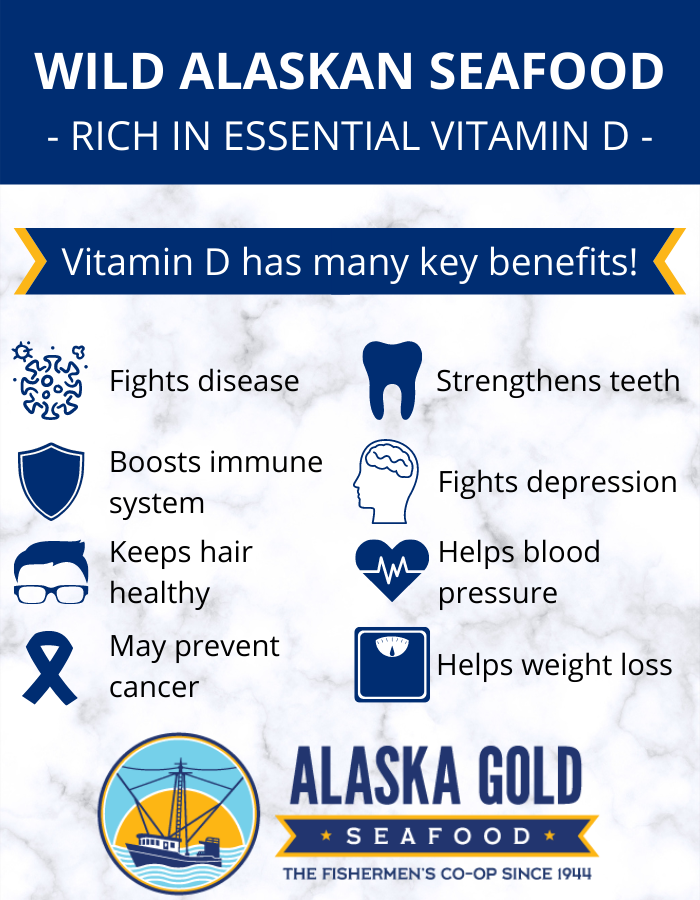
Just one of our 6-ounce wild coho salmon portions has over 90% of the recommended daily value of vitamin D. One of our sablefish portions also has over 90% of the daily value of vitamin D.

That vitamin D is significant for our health!
Seafood, in particular our wild coho salmon and wild sockeye salmon but also our sablefish, is one of the greatest natural food sources for vitamin D. Vitamin D builds strong and healthy bones, heart, muscles, lungs and brain, helps your body fight infection, and is key for good overall health. Vitamin D is oil soluble, which means you need to eat fat to absorb it. And fatty, oily fish and provide some of that fat.
For those doing the math, the 19 mcg of vitamin D in a 6-ounce portion of coho salmon equals 760 IU. The recommended amount of vitamin D to take for most people is 600 I.U. or more per day. And poached, grilled, sautéed or baked, our Alaska Gold coho salmon is a lot more delicious than the supplement pills that people in northern latitudes or those with osteoporosis frequently take. In fact, the vitamin D3 in seafood can be more effective than vitamin D2, which frequently appears in multi-vitamins.
According to research, Vitamin D is believed to:
* Fight cardiovascular diseases
* Lower chances of getting the common cold
* Curb depression
* Strengthen teeth and bones
* Keep hair healthy
* Reinforce the immune system
* Manage blood pressure
* Possibly help prevent cancer
* Help weight loss
There are numerous research studies that highlight the importance of vitamin D in fighting diseases such as multiple sclerosis and decreasing your chance of developing cardiovascular disease. Eating seafood twice a week can reduce your risk of heart disease by at least 36%! It has also been shown to give you more energy throughout the day.
Researchers believe that because vitamin D is important to brain function and that insufficient vitamin D levels may play a role in depression and other mental illnesses, which could mean that taking more vitamin D could help manage our moods and prevent depression.
It has been observed that vitamin D is important for increasing the absorption of calcium and phosphate from the diet you take. Vitamin D also helps in strengthening your teeth’s battle with germs by helping your body absorb calcium and phosphate better. Vitamin D, in itself, is also potentially more important than calcium for bone health. So, vitamin D can help build bones and teeth.
While eating salmon might not give you long locks of bushy hair, vitamin D deficiencies are associated with hair loss.
Vitamin D reinforces the immune system by reducing your chances of developing cold and flu and other respiratory infections.
Though research has not illuminated the hows and whys of the link between vitamin D deficiency and high blood pressure, there is at least a link between getting vitamin D and having lower blood pressure. Vitamin D deficiencies have been linked to a higher risk of heart attacks and increased blood pressure. At a more subjective level, we’ve found that eating fish helps us feel calmer and happier.
Research backs up at least the possibility that vitamin D can be helpful in preventing some forms of cancer. There is early evidence of the possibility of an association between vitamin D and lower risks of cancer in mice, as vitamin D has been shown to slow or prevent the development of cancer in mice. However, the evidence is inconsistent and inconclusive for human beings, so we can’t say what effects taking more vitamin D will have in terms of preventing cancer.
A 2015 study indicates that vitamin D might even help with weight loss.
In general, most of the benefits of vitamin D seem to have the biggest effect with those who were already deficient in vitamin D either from diet or lack of sunshine. If you’re in a particularly dark part of the world or don’t eat enough seafood, you should probably talk to your doctor about getting tested for vitamin D levels. Other groups of people at risk of vitamin D deficiency include those with digestive disorders such as celiac disease. Pregnant and nursing women, as well as women with osteopenia or osteoporosis, frequently need more vitamin D to maintain bone health.
These are just a tiny amount of the links to studies we found supporting vitamin D’s health benefits.



